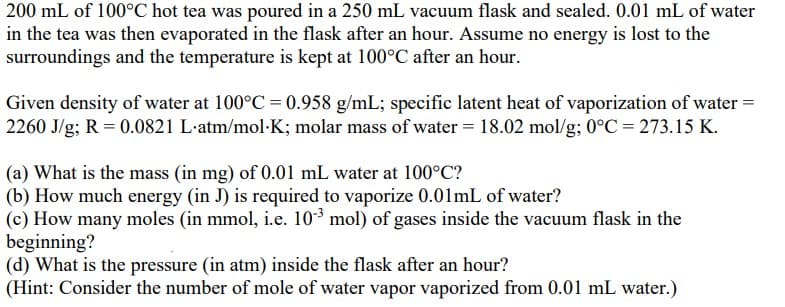200 mL of 100°C hot tea was poured in a 250 mL vacuum flask and sealed. 0.01 mL of water in the tea was then evaporated in the flask after an hour. Assume no energy is lost to the surroundings and the temperature is kept at 100°C after an hour. Given density of water at 100°C = 0.958 g/mL; specific latent heat of vaporization of water = 2260 J/g; R = 0.0821 L-atm/mol-K; molar mass of water = 18.02 mol/g; 0°C = 273.15 K. (a) What is the mass (in mg) of 0.01 mL water at 100°C? (b) How much energy (in J) is required to vaporize 0.01mL of water? (c) How many moles (in mmol, i.e. 10-³ mol) of gases inside the vacuum flask in the beginning? (d) What is the pressure (in atm) inside the flask after an hour? (Hint: Consider the number of mole of water vapor vaporized from 0.01 mL water.)
200 mL of 100°C hot tea was poured in a 250 mL vacuum flask and sealed. 0.01 mL of water in the tea was then evaporated in the flask after an hour. Assume no energy is lost to the surroundings and the temperature is kept at 100°C after an hour. Given density of water at 100°C = 0.958 g/mL; specific latent heat of vaporization of water = 2260 J/g; R = 0.0821 L-atm/mol-K; molar mass of water = 18.02 mol/g; 0°C = 273.15 K. (a) What is the mass (in mg) of 0.01 mL water at 100°C? (b) How much energy (in J) is required to vaporize 0.01mL of water? (c) How many moles (in mmol, i.e. 10-³ mol) of gases inside the vacuum flask in the beginning? (d) What is the pressure (in atm) inside the flask after an hour? (Hint: Consider the number of mole of water vapor vaporized from 0.01 mL water.)
College Physics
11th Edition
ISBN:9781305952300
Author:Raymond A. Serway, Chris Vuille
Publisher:Raymond A. Serway, Chris Vuille
Chapter11: Energy In Thermal Processes
Section: Chapter Questions
Problem 35P
Related questions
Question
I am stuck only part d

Transcribed Image Text:200 mL of 100°C hot tea was poured in a 250 mL vacuum flask and sealed. 0.01 mL of water
in the tea was then evaporated in the flask after an hour. Assume no energy is lost to the
surroundings and the temperature is kept at 100°C after an hour.
Given density of water at 100°C = 0.958 g/mL; specific latent heat of vaporization of water =
2260 J/g; R = 0.0821 L.atm/mol K; molar mass of water = 18.02 mol/g; 0°C = 273.15 K.
(a) What is the mass (in mg) of 0.01 mL water at 100°C?
(b) How much energy (in J) is required to vaporize 0.01mL of water?
(c) How many moles (in mmol, i.e. 10-³ mol) of gases inside the vacuum flask in the
beginning?
(d) What is the pressure (in atm) inside the flask after an hour?
(Hint: Consider the number of mole of water vapor vaporized from 0.01 mL water.)
Expert Solution
This question has been solved!
Explore an expertly crafted, step-by-step solution for a thorough understanding of key concepts.
This is a popular solution!
Trending now
This is a popular solution!
Step by step
Solved in 2 steps

Knowledge Booster
Learn more about
Need a deep-dive on the concept behind this application? Look no further. Learn more about this topic, physics and related others by exploring similar questions and additional content below.Recommended textbooks for you

College Physics
Physics
ISBN:
9781305952300
Author:
Raymond A. Serway, Chris Vuille
Publisher:
Cengage Learning

College Physics
Physics
ISBN:
9781285737027
Author:
Raymond A. Serway, Chris Vuille
Publisher:
Cengage Learning

College Physics
Physics
ISBN:
9781938168000
Author:
Paul Peter Urone, Roger Hinrichs
Publisher:
OpenStax College

College Physics
Physics
ISBN:
9781305952300
Author:
Raymond A. Serway, Chris Vuille
Publisher:
Cengage Learning

College Physics
Physics
ISBN:
9781285737027
Author:
Raymond A. Serway, Chris Vuille
Publisher:
Cengage Learning

College Physics
Physics
ISBN:
9781938168000
Author:
Paul Peter Urone, Roger Hinrichs
Publisher:
OpenStax College

Physics for Scientists and Engineers
Physics
ISBN:
9781337553278
Author:
Raymond A. Serway, John W. Jewett
Publisher:
Cengage Learning

Physics for Scientists and Engineers with Modern …
Physics
ISBN:
9781337553292
Author:
Raymond A. Serway, John W. Jewett
Publisher:
Cengage Learning
